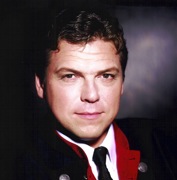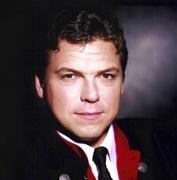Everything is in place: beauty and variety of sound; expressive use of words; a steady, seemingly endless supply of breath; a delight in communicating through song. Schade is also thoroughly at home on the stage, moving purposefully and creating comic effects with neat, well-timed gestures.

The Schubertiade began with songs for the four seasons: Gott im Frühling, Die Sommernacht, Herbst, and Der Winterabend. Stopping after the first song to speak to the audience served both to forestall applause within song groupings and to inform us that the main subject of the day would be the usual: love, in its many manifestations, from ardor to disappointment. The program skillfully combined familiar repertoire with seldom-heard songs.
One group included songs about music itself, starting with An die Musik and continuing with An mein Klavier, An die Laute, and An die Leier: To music, the art that so often lifts me from the difficulties of life into heavenly bliss. To my piano, which enables me to sing. To the lute, which I can trust to send messages to my mistress, in defiance of envious neighbors. To the lyre, which can move from heroic outbursts to tender expressions of love.
The familiar Ständchen (Serenade) was included in this group, as the lover woos his lady, assisted by nightingales, and pleads with her to respond. Der Musensohn (The Muses’ son) ended the group with a torrent of words from Goethe, lightning fast but still able to invoke the twirling dance of a maiden (“Das steife Mädchen dreht sich”).
Highlights abounded over the course of the recital: From Der Winterabend, an expressive portamento on “so ganz für mich” (so complete in myself), the reiteration of “Seufze still und sinne und sinne” (I sigh quietly, thinking and feeling); from An mein Klavier, “Hauch’ ich dir meine Empfindungen ein” (I whisper to you my feelings); from An die Laute, the nasty sound of “Neidisch sind des Nachbars Söhne” (The neighbors’ sons are jealous); from An die Leier, voice and piano united in the roar of a victory march or the dulcet sounds of love.
Nonpareil Partner at the Keyboard
Schade has a superb musical collaborator in Malcolm Martineau, his accompanist. From the delicate placing of the last two notes of the opening song, we knew we were in for a treat equal to the vocal feast. Martineau matched Schade in grace, wit, dynamics, and color; made the piano sound like a lute; and poured out a torrent of notes for Der Musensohn, ending the first half of the program on a lovely, crashing chord.The second half began with Glaube, Hoffnung, und Liebe (Faith, hope, and love). Schade gave the last verse in particular, Schubert’s masterful elaboration on the Biblical words, a thrilling performance. By the time this song appeared, I was inclined to remember that the text from Corinthians continues: “And the greatest of these is love.”
Gesture enlivened Liebhaber in allen Gestalten (Sweethearts of all kinds): a fish-face for the first verse, “Ich wollt’, ich wär ein Fisch” (I wish I were a fish), and hands turned out on “So nimm mich nur hin” (Take me for that; I am what I am). Together, Schade and Martineau made a gem of Schubert’s gorgeous setting of Goethe’s poem An den Mond (To the moon).
In an impressive feat of programming, Schade ended with a group of songs requiring great reserves of vocal control — especially the closing Nacht und Träume (Night and dreams). Starting with “Heil’ge Nacht” (Holy night), he spun out the long, slow, quiet lines, superbly supported and achingly expressive.
An ovation from the audience drew Schade and Martineau back four times, and they finally offered an encore: “Der Neugierige” from Die Schöne Müllerin.

